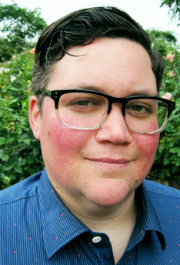PSU professor talks on queer studies
March 6, 2018
When one thinks of LGBTQ rights, they often think of events such as the pride parades seen in places like Seattle, San Francisco, and New York. The general public doesn’t usually see rural communities as having a thriving LGBTQ community.
Miriam Abelson, assistant professor of women’s gender and sexuality studies at Portland State University, discussed her research on these topics last Wednesday, Feb. 28 at 5 p.m. in Black Hall 151.
In her book “Men in Place: Contemporary Context of Race, Sexuality, and Trans-Masculinities,” Abelson researched the experiences of rural LGBTQ people, which showed that commonly held perceptions about the lives and experiences of these people are sometimes untrue.

“We have ideas that LGBTQ people can only live in large cities or that they can only be happy if they move to larger cities. LGBTQ people do live and even thrive in rural places,” Abelson said.
Abelson explained that for many LGBTQ people, fitting in lies more in their race and how they present themselves than if they are LGBTQ. This, in addition to whether or not they and their families are a part of the local community, means that for many people being LGBTQ isn’t the biggest part of fitting into these rural areas.
“Rural places are under this larger economic threat, so this actually leads to some more inclusion in some cases, such as when transgender people share local values,” Abelson said.
For some LGBTQ people cities can be more difficult places to live in, according to Abelson.
In the national survey, people living in urban places report about the same amount of violence and discrimination. According to Abelson, part of that is because someone living in a small enough place knows most people, including those who may be prejudiced against LGBTQ people, making it easier to avoid them.
“In even more remote places, places on the frontier, there’s actually more accountability. In a town of 1000 vs a town of 12000 you see those people all of the time,” Abelson said.
Abelson’s research has also gone specifically into the roles of men in places differing in geography and density.
While many see the extremes often portrayed in stereotypical ideas of city men being weak and effeminate and rural men being hyper-masculine and toxic, Abelson has found that in general, a sort of in-between masculinity is generally the most accepted.
While there are differences in how men portray their masculinity, these differences are mostly superficial.
“What I am trying to untangle is that if men’s roles are changed. Some of these changes are more on the surface, as opposed to deep inequality. We still see pretty persistent race, class, and gender inequality, and we are looking at how it is all connected to each other,” Abelson said.


